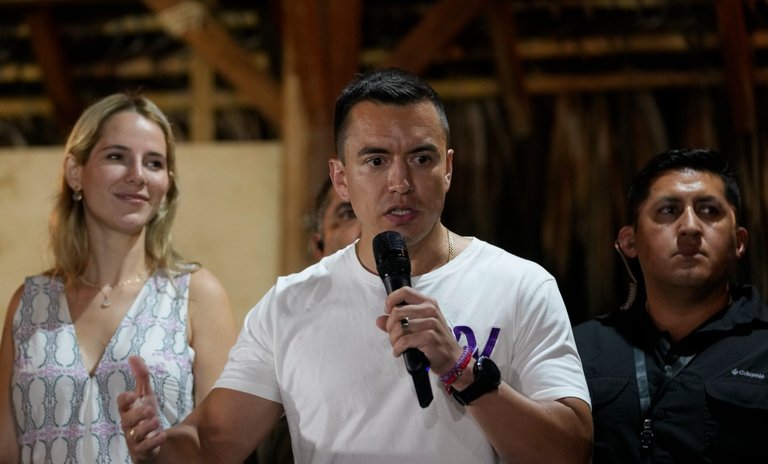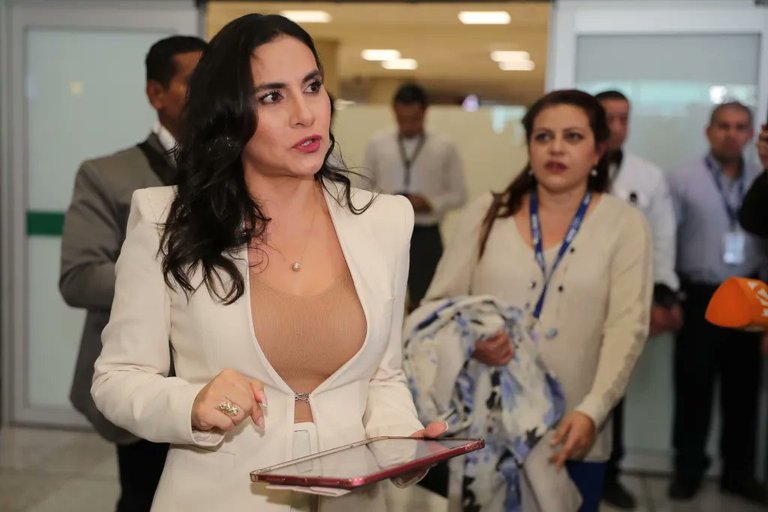
The constitutional vice-president of Ecuador has denounced that President Daniel Noboa has consummated a “coup d'état” by not ceding to her the power of the nation while he is in campaign. Verónica Abad, at odds with the head of the Carondelet Palace since the very 2023 electoral campaign, presents herself as the victim of a “brutal persecution, which has only one objective: to take power by force”. At least one electoral official warns that Noboa must request a license to campaign, and has asked the highest authority in the matter to take a stance. The President relies on debatable interpretations of the law and decisions of the Constitutional Court to dismiss the alleged requirement. The argument that serves as mortar to his narrative is that the time he has been in Carondelet is not imputable as a regular presidential term, because he would be acting as a sort of substitute for Guillermo Lasso. The Executive argues in particular that a legislative provision introduced in 2020 is in contradiction with the Constitution itself and a 2012 ruling of the Constitutional Court, but it seems to me a very vulnerable judgment.
The Ecuadorian Magna Carta states in its Article 114 that “[the] popularly elected authorities may be reelected only once, consecutively or not, for the same position”, without imposing as a condition that they resign to it. Article 93 of the Organic Electoral Act states in its current wording that “[the] dignitaries who opt for immediate reelection to the same position shall take an unpaid leave of absence from the beginning of the electoral campaign.” The Noboa administration defends that here the legislature “[placed] a limitation not foreseen in the constitutional framework,” “erroneously” converting the leave of absence from a right—as it was handled in the 2012 version of Article 93, then defended by the Constitutional Court—to an obligation. However, the ruling party “forgets” the distinction made by the legislator between resignation and license, a requirement that does not go against the spirit of the article at all. But let us remember in any case that, for Noboa, Article 93 should not apply here because "he is not being reelected". It could be better to plainly establish that those elected to complete a certain term of office—after the activation of the so-called “cross death”—may run in two subsequent electoral processes.
 Ecuadorian president Daniel Noboa (source).
Ecuadorian president Daniel Noboa (source).However, the intricacies of this matter lie in the legality of the act of not recognizing Abad as the constitutional vice-president of the Republic, although the Constitution is not so precise to assess the issue. Noboa decided that by not showing up in Ankara to comply with her designation as “temporary counselor” in the Ecuadorian embassy there, a “temporary absence in the position” has been configured. So until she does not comply with this assignment, her election-won position will be occupied by Cynthia Gellibert, the General Secretary of Public Administration and Cabinet of the Presidency. It was to the latter that Noboa finally delegated his functions as president between last Thursday and this Sunday, through a decree challenged before the Constitutional Court. Now, if Abad appears in Ankara and recovers her position as Vice-President of the Republic, how would she take charge of the country in the upcoming temporary absence of Noboa for proselytizing activities—i.e., electoral campaign? In a virtual manner from Çankaya or would she travel to Quito?
The National Assembly has argued in favor of Abad in this intense controversy, while experts in constitutional and electoral matters have also criticized Noboa's actions, accusing him of eroding the legal system with a flawed interpretation of what constitutes a case of “force majeure”, the wild card of the Miami-born president. This Saturday, a judge revoked protection measures in favor of Abad that had been approved by the Metropolitan Board of Women's Rights of the Municipality of Quito. The judge affirms that the actions denounced by the vice-president, such as her first rare assignment to the diplomatic mission in Israel—recently she was also forbidden access to her office in the capital—are ultimately decisions that fall within the presidential jurisdiction.
 Ecuadorian vice-president Verónica Abad (source).
Ecuadorian vice-president Verónica Abad (source).One America? 👇
Mexico sends firefighters to California to help with raging blazes https://t.co/YHPwANHZch
January 11, 2025— Yahoo News (@YahooNews)
And this is all for our report today. I have referenced the sources dynamically in the text, and remember you can learn how and where to follow the LATAM trail news by reading my work here. Have a nice day.


Congratulations @limonta! You have completed the following achievement on the Hive blockchain And have been rewarded with New badge(s)
You can view your badges on your board and compare yourself to others in the Ranking
If you no longer want to receive notifications, reply to this comment with the word
STOP